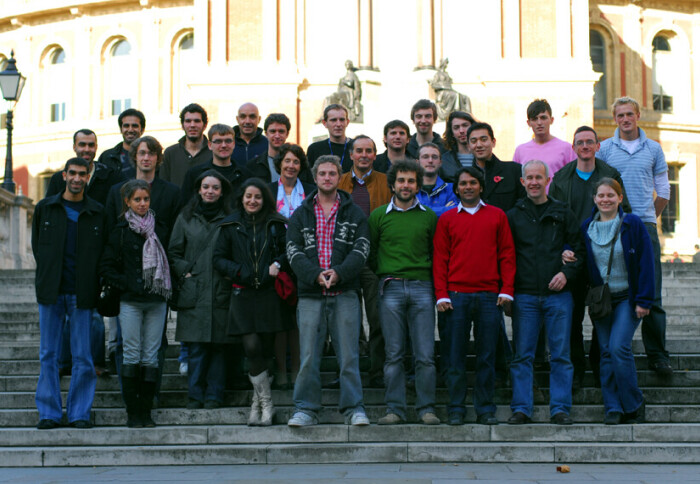Imperial celebrates 15 years of the MSc in Sustainable Energy Futures

The Class of 2008: The first graduates of the MSc in Sustainable Energy Futures
It’s 15 years since the first students graduated from Imperial College London’s ground-breaking postgraduate programme in sustainable energy.
Since 2008, almost 700 students have graduated from the MSc in Sustainable Energy Futures – an intensive one-year course run by Energy Futures Lab, Imperial’s global energy institute, with the aim of educating the next generation of leaders in the energy sector.
The programme’s milestone birthday was celebrated at a special event for alumni and students hosted by the institute at the Millennium Gloucester Hotel in South Kensington on Friday, 17th November.

Among those in attendance was Sandro Macchietto, Professor of Process Systems Engineering in the Department of Chemical Engineering, who spearheaded the design of the course and served as its first Director. He recalled how the MSc programme, which was unlike any other at the time, was developed:
“A lot of the work on energy was being done along disciplinary lines – excellent work on batteries, excellent work on materials, on thermodynamics, on nuclear, and so on – but it became apparent that the solution was in the cracks. You cannot fix energy by just improving one of the bits.
“And so, we said, who is going to be doing that? There was no training, there was no programme available. So, we decided, let’s do our own. Let’s do something highly distinctive, a bit imaginative, that will put us at the forefront of the field.”
The course was launched in 2007 with teaching staff from a cross-section of departments in the Faculties of Engineering and Natural Sciences and the Imperial College Business School. This interdisciplinary approach has been the key to its success.
“The MSc is unique because of its breadth,” says Professor Nigel Brandon OBE, Dean of the Faculty of Engineering and the Founding Director of Energy Futures Lab. “It very much brings together the disciplines that you need to understand and make a quantitative assessment and judgement on a wide range of energy technologies, not only technically but also economically and from a social and societal perspective.”
An evolving programme
The course has evolved over the past 15 years as the energy transition has progressed and our energy systems have changed, according to Dr Fei Teng, the current Director of Education at Energy Futures Lab:
“We have introduced data and digitalisation modules, for example, to reflect what’s happening in industry. We also look at sustainable fuels to reflect the increasing need for hydrogen, and we also see a more diverse cohort; for the past four years we’ve had students from over 20 different countries, and a very good balance between female and male students.”
Today, the MSc boasts a vibrant and engaged alumni community. Victoria Ebo, Energy Futures Lab’s Operations and Networks Manager, says the programme’s graduates play an essential role in the delivery of the Sustainable Energy Futures programme:
“The SEF alumni are an invaluable asset to Energy Futures Lab and to the course. I’ve had the opportunity to work with so many of them, and they come to me – they come back to speak to our current students, to offer job opportunities and just to be helpful. I love being part of a community that wants to get involved.”
Watch our video below to hear from alumni and current and former staff of the MSc in Sustainable Energy Futures about what makes the programme so special.

Article text (excluding photos or graphics) © Imperial College London.
Photos and graphics subject to third party copyright used with permission or © Imperial College London.
Reporter
Conor McNally
The Grantham Institute for Climate Change